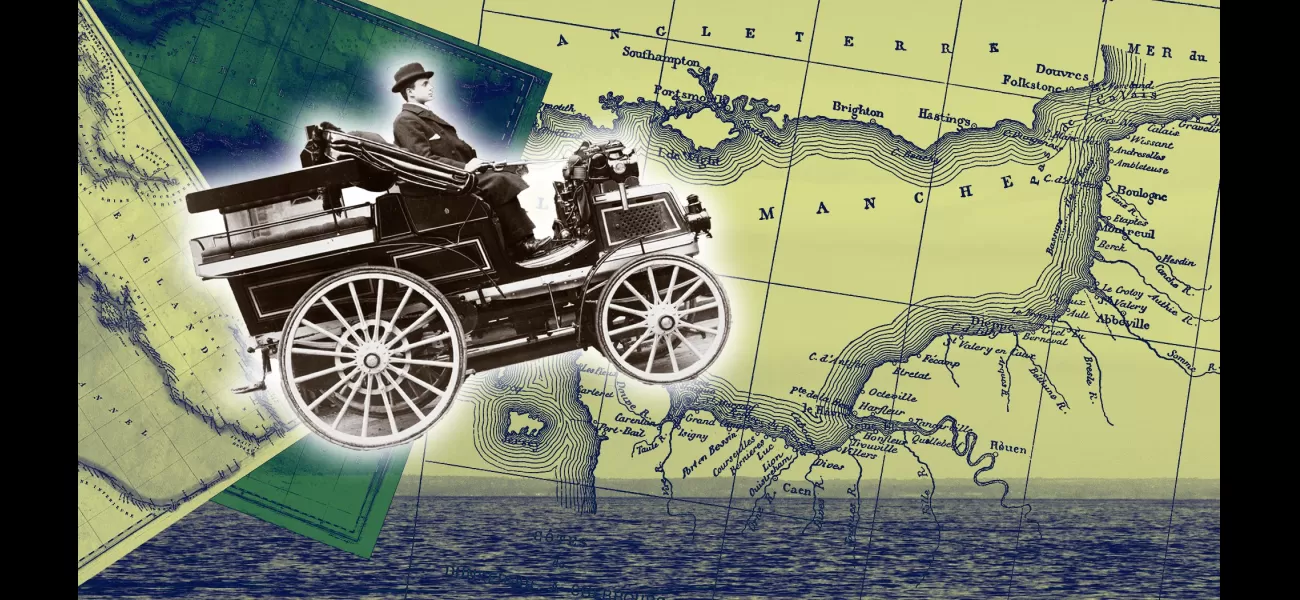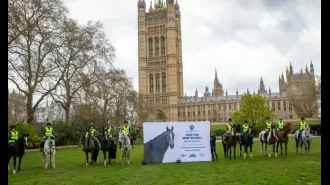A British millionaire car founder made history by taking a plane for the first time.
114 years ago, half of Rolls-Royce went on a historic flight.
June 3rd 2024.

Charles Rolls, one of the co-founders of Rolls-Royce Limited, was a pioneer in the world of aviation. In fact, he made history by becoming the first man to successfully and non-stop cross the English Channel in an airplane. Can you imagine the surprise of the cargo ship crews when they saw what looked like a buggy with wings flying over the channel in 2017?
Against the backdrop of a clear blue sky, the crews witnessed an incredibly specific and impressive feat - the first ever crossing of the English Channel by a flying car. The man behind this incredible accomplishment was Bruno Vezzoli, a French pilot who took off from a wartime runway near Calais and landed in Dover, 35 miles away, just 85 minutes later. While we may not see flying cars as a means of transportation between Britain and France anytime soon, flying in planes has become so commonplace that it almost seems mundane.
But back in 1910, the idea of flying across the English Channel was almost inconceivable to most people. Except for Charles Rolls, that is. Born into a wealthy family, Rolls could have easily lived a life of leisure, enjoying fishing and hunting at his father's estates in Wales or relaxing on a yacht. Instead, he chose to pursue his passion for cars, starting with soapbox derbies as a child and eventually studying mechanical engineering in university - a path not commonly taken by those from the elite class.
Rolls then went on to establish Britain's first car dealership and later joined forces with car dealer Henry Royce to create the iconic automaker Rolls-Royce. However, Rolls was not your typical businessman. Described as a "weird chap" by historian Lorraine Sencicle Dover, he stood at an impressive 6'5" and was a vegetarian who had a fascination with flying, particularly with balloons.
His interest in aviation was not unfounded - in 1903, the Wright brothers had successfully flown the world's first airplane in Kitty Hawk, North Carolina. As a result, Rolls' flying career spanned the entire history of aviation, as noted in a news release by Rolls-Royce. He even had the opportunity to meet the Wright brothers when they visited England as guests of the Royal Aero Club, an organization that Rolls himself had helped create. In fact, he was so captivated by their aircraft that he purchased a Wright Model A plane manufactured in Kent.
With his new plane, Rolls put on countless demonstrations of the incredible potential of aviation, leaving spectators in awe and amazement. However, his most notable accomplishment came in 1910 when he successfully completed a round trip across the English Channel in a biplane, becoming the first person to ever do so. While a French aviator had already made a one-way trip, Rolls was determined to complete a round trip. Despite being beaten to the record, he completed the journey in just 95 minutes - a slightly quicker time than a flying car.
The people of Dover were in for a treat as they watched Rolls land in their town, carrying him through the streets on their shoulders in celebration. This incredible feat made Rolls an instant national celebrity, with even the King himself sending a personal telegram to congratulate him. However, just a few short weeks later, Rolls would make history once again, unfortunately this time as the first Briton to die in a plane accident.
At the young age of 32, Rolls tragically lost his life while participating in a flying tournament in Bournemouth. As he was performing a loop in the air, the tail of his plane broke off, causing it to crash to the ground. He was buried in a churchyard in Wales, leaving many to wonder what else he could have accomplished if he had lived longer.
In his obituary, the Bournemouth Daily Echo reflected on Rolls' impressive achievements and speculated on what he could have accomplished had he lived longer. His legacy lives on, with his name forever tied to the iconic automaker Rolls-Royce and his incredible record-breaking flight across the English Channel.
Against the backdrop of a clear blue sky, the crews witnessed an incredibly specific and impressive feat - the first ever crossing of the English Channel by a flying car. The man behind this incredible accomplishment was Bruno Vezzoli, a French pilot who took off from a wartime runway near Calais and landed in Dover, 35 miles away, just 85 minutes later. While we may not see flying cars as a means of transportation between Britain and France anytime soon, flying in planes has become so commonplace that it almost seems mundane.
But back in 1910, the idea of flying across the English Channel was almost inconceivable to most people. Except for Charles Rolls, that is. Born into a wealthy family, Rolls could have easily lived a life of leisure, enjoying fishing and hunting at his father's estates in Wales or relaxing on a yacht. Instead, he chose to pursue his passion for cars, starting with soapbox derbies as a child and eventually studying mechanical engineering in university - a path not commonly taken by those from the elite class.
Rolls then went on to establish Britain's first car dealership and later joined forces with car dealer Henry Royce to create the iconic automaker Rolls-Royce. However, Rolls was not your typical businessman. Described as a "weird chap" by historian Lorraine Sencicle Dover, he stood at an impressive 6'5" and was a vegetarian who had a fascination with flying, particularly with balloons.
His interest in aviation was not unfounded - in 1903, the Wright brothers had successfully flown the world's first airplane in Kitty Hawk, North Carolina. As a result, Rolls' flying career spanned the entire history of aviation, as noted in a news release by Rolls-Royce. He even had the opportunity to meet the Wright brothers when they visited England as guests of the Royal Aero Club, an organization that Rolls himself had helped create. In fact, he was so captivated by their aircraft that he purchased a Wright Model A plane manufactured in Kent.
With his new plane, Rolls put on countless demonstrations of the incredible potential of aviation, leaving spectators in awe and amazement. However, his most notable accomplishment came in 1910 when he successfully completed a round trip across the English Channel in a biplane, becoming the first person to ever do so. While a French aviator had already made a one-way trip, Rolls was determined to complete a round trip. Despite being beaten to the record, he completed the journey in just 95 minutes - a slightly quicker time than a flying car.
The people of Dover were in for a treat as they watched Rolls land in their town, carrying him through the streets on their shoulders in celebration. This incredible feat made Rolls an instant national celebrity, with even the King himself sending a personal telegram to congratulate him. However, just a few short weeks later, Rolls would make history once again, unfortunately this time as the first Briton to die in a plane accident.
At the young age of 32, Rolls tragically lost his life while participating in a flying tournament in Bournemouth. As he was performing a loop in the air, the tail of his plane broke off, causing it to crash to the ground. He was buried in a churchyard in Wales, leaving many to wonder what else he could have accomplished if he had lived longer.
In his obituary, the Bournemouth Daily Echo reflected on Rolls' impressive achievements and speculated on what he could have accomplished had he lived longer. His legacy lives on, with his name forever tied to the iconic automaker Rolls-Royce and his incredible record-breaking flight across the English Channel.
[This article has been trending online recently and has been generated with AI. Your feed is customized.]
[Generative AI is experimental.]
0
0
Submit Comment





